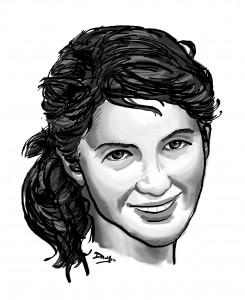I have limited tolerance for intolerance, and perhaps even less tolerance for those people who take texts solely at face value. Because much of my life has been about reading books critically and working with and for minority communities, I have an abiding sense of confusion about people who espouse a set of beliefs without questioning where those beliefs came from, and the effect of those beliefs on other people.
My intolerance for text-pounding and bigotry means that I have exactly no patience with campaigns against legalizing gay marriage or with individuals who believe that members of the LGBTQ community across the country are owed fewer rights than other citizens.
I write this with mingled pride and outrage: we as a country have made real progress in the last several years on this issue. We have made marriage legal for all people in an increasingly large number of states, and civil unions are legal in others.
[media-credit id=8398 align=”alignleft” width=”245″] [/media-credit]But this progress is insufficient: equality is unequal across the nation, and equality cannot come quickly enough.
[/media-credit]But this progress is insufficient: equality is unequal across the nation, and equality cannot come quickly enough.
In spite of the fact that our founding documents are some of the most liberal of their kind, we have always managed to oppress someone. To justify this oppression, we have principally turned to the Bible and pseudo-science. Movements ranging from the Confederacy, to those who stood against women’s suffrage to Social Darwinism have argued for the pre-eminence of heterosexual white men. People associated with the principles of these movements still exist — and some of them are running our country.
I want to call them out not only for their intolerance, but for their hypocrisy in supporting equality only for some and for their poor critical reading skills.
Whether or not you believe that the Bible was written by God, it is important to understand that the Bible was put together (and I would argue written) by a small group of formerly nomadic individuals who were trying to create and preserve a sense of community identity. In a world in which children died all too frequently, and in which great enemies loomed at every side, it is no wonder that they wanted a larger population. So they wrote tracts about the importance of strong male leadership in politics and war, the place of women in the domestic sphere and the importance of heterosexual couples to procreation. These qualities were what they felt were necessary to stay together, and survive.
But these texts were written thousands of years ago, and while I embrace the ethical framework the texts gave us, as well as the culture of scholarship and dialogue that scripture wrought, I find it hard to embrace an ancient culture as our ideological role model. We can respect them as intellectual forbearers without needing to espouse everything that they taught, because our world is radically different from theirs.
Just to show how different our world is, I turn to my childhood in Berkeley, California, where many of my friends had two moms or two dads. These friends weren’t any different than I was, or my classmates with straight parents were. I doubt if we really recognized a difference in the gender composition of our parents, as we paid attention to them mostly as a source of rides and snacks. We accepted these partnerships on the same terms that we accepted heterosexual marriages — as something all grown-ups did.
It wasn’t until years later that I discovered that none of these couples had been married. Some got civil unions when they became legal in California, receiving the limited set of rights that civil unions carry with them. But to this day these couples, my surrogate parents, cannot get married unless they leave the state or country, despite the fact that these couples have been “married” in the eyes of our community for decades and raised healthy, successful children together.
Does it seem fair to tell these good parents and pillars of their communities that they aren’t worthy of equality because a book written more than two thousand years ago, a book many of them don’t believe in, says they shouldn’t live as they do?
I contend that it is possible to believe in God, read the Bible and be an American without needing to choose amongst these three identities — I do. But it requires a little more intellectual effort, and a little more self-reflection, than many seem willing to put in.
I hope that the most recent election is a sign that we as a country are moving into a new world of equality — and a new world of reading critically.
Zoe Mercer-Golden is a senior in Davenport College. Contact her at zoe.mercer-golden@yale.edu .







